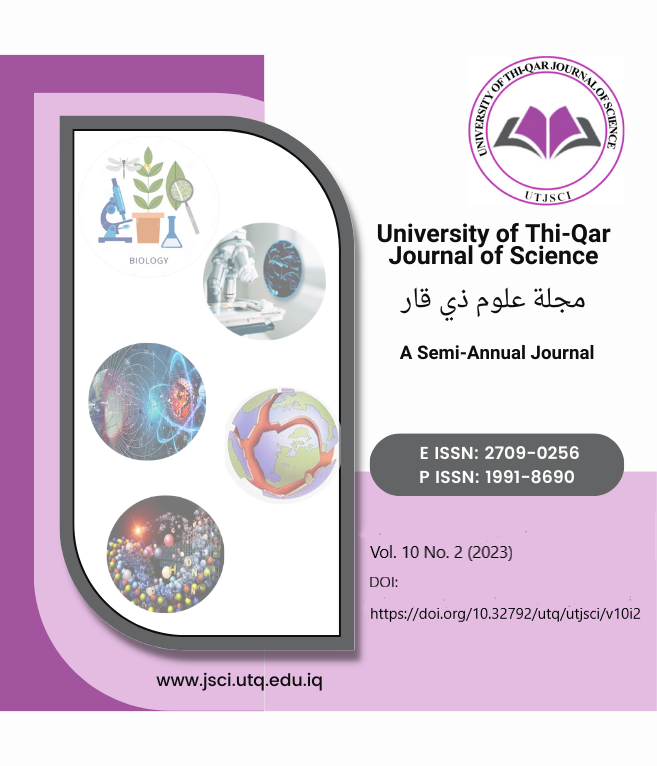Attitudes and Commitment of Healthcare Workers toward Methicillin-resistant Staphylococcus Aureus (MRSA) Infections in Hospitals of Thi-Qar Governorate
DOI:
https://doi.org/10.32792/utq/utjsci/v10i2.1085Keywords:
Attitudes, Commitment, Health Care Workers, Methicillin-resistant Staphylococcus aureus (MRSA)Abstract
The nosocomial infection Methicillin-resistant Staphylococcus aureus (MRSA) can infect both healthcare workers and patients and have an impact on the standard of treatment offered in hospitals.
The study aims to Identify the relations between the attitudes, and commitment of healthcare workers to prevent methicillin-resistant S. aureus (MRSA) and sociodemographic characteristics.
A descriptive cross-sectional study was carried out for 362 healthcare workers randomly chosen from four hospitals and distributed as follows: 125 from Nasiriyah Teaching Hospital, 80 from Al-Hussein Teaching Hospital, 80 from Al-Haboubi Teaching Hospital and 77 from Souk Al-Shuyoukh General Hospital Between October 1, 2022, to May 1, 2023, and data was collected using a self-report paper-based questionnaire.
Our findings indicated that 75.1% of the participants have neutral attitudes concerning MRSA infection. The relationships between attitudes and age, education, marital status, job title, and years of service were statistically significant (P <0.05).
Healthcare workers' commitment were generally moderated. The participant's commitment to MRSA infection prevention was significantly correlated (P <0.05) with their age, education level, job title, and shift time.
So we can conclude that Healthcare workers' attitudes toward the prevention of MRSA infection were neutral while Healthcare workers' commitment to preventing MRSA infection was poor.
The study recommended Providing appropriate health facilities and personal protective equipment, Searching for the reasons behind non-compliance of HCWs, and Continual surveillance by medical institution authorities to protect healthcare workers against MRSA infection.
Received: 2023-07-07
Revised: 2023-07-23
Accepted: 2023-07-25
References
M. C. Bârlean et al., “Respiratory healthcare-associated infections in the clinic of oral and maxilo- facial surgery iași ( 2011 -2018 ),” Romanian Journal of Oral Rehabilitation., vol. 13, no. 3, 2021.
V. Liyanapathirana and V. Thevanesam, “Combating Antimicrobial Resistance,” Sri Lankan J. Infect. Dis., vol. 6, no. 2, p. 72, 2016.
H. Al-hussaniy and Z. S. Al-tameemi, “Methicillin-Resistant Staphylococcus aureus and New Delhi Metallo beta-lactamases- types of antibiotic resistance, methods of prevention.,” Med. Pharm. J., vol. 1, no. 1, pp. 14–24, 2022.
A. Mairi, A. Touati, and J. P. Lavigne, “Methicillin-Resistant Staphylococcus aureus ST80 Clone: A systematic review,” Toxins (Basel)., vol. 12, no. 2, pp. 1–21, 2020.
M. Navidinia, F. Fallah, B. Lajevardi, M. Shirdoost, and J. Jamali, “Epidemiology of methicillin-resistant Staphylococcus aureus isolated from health care providers in mofid children hospital,” Arch. Pediatr. Infect. Dis., vol. 3, no. 2, 2015.
B. J. Spencer and U. Chukwuma, “Methicillin-Resistant Staphylococcus aureus ( MRSA ) Infections in the Department of Defense ( DOD ): Annual Summary 2013,” The Navy and Marine Corps Public Health Center., no. January 2015.
E. A. Suss, “Nurse Knowledge, Attitude, and Compliance Related to Methicillin Resistant Staphylococcus aureus,” The Aquila Digital Community
Honors., 2017.
K. Marimuthu, D. Pittet, and S. Harbarth, “The effect of improved hand hygiene on nosocomial MRSA control,” Antimicrob. Resist. Infect. Control, vol. 3, no. 1, pp. 1–6, 2014.
L. O. H. Herimat, “Knowledge, Attitudes, and Adherence to Methicillin-Resistant Staphylococcus aureus Transmission Prevention Among Health Care Workers,” An-Najah National University, p. 105, 2016.
N. M. Abdelsalam, H. Bakry, S. Bolbol, A. Abdelsalam, and D. Atef, “Methicillin-Resistant Staphylococcus Aureas: an Interventional Study Among Health Care Workers of Surgical Icu At Zagazig University Hospital, Egypt,” Egypt. J. Occup. Med., vol. 41, no. 1, pp. 97–113, 2017.
A. Wolfensberger et al., “Determinants for voluntary participation in staff screening during a methicillin-resistant Staphylococcus aureus (MRSA) outbreak on a neonatal ward,” Infect. Control Hosp. Epidemiol., vol. 42, no. 7, pp. 881–884, 2021.
A. L. Pedro, A. Sousa-Uva, and E. Pina, “Endemic methicillin-resistant Staphylococcus aureus: Nurses’ risk perceptions and attitudes,” Am. J. Infect. Control., vol. 42, no. 10, pp. 1118–1120, 2014.
Deepak et al., “Hand hygiene knowledge, attitude, practice and hand microflora analysis of staff nurses in a rural tertiary care hospital,” J. Fam. Med. Prim. Care, vol. 6, no. 2, pp. 169–170, 2017.
B. Mambwe, “An assessment of hand hygiene practices among health care workers with regards to communicable diseases at Chilenje level one hospital,” Cavendish University Zambia., vol. 21, no. 1, pp. 1–9, 2020.
E. Rajni, P. Rathi, M. Malik, S. Mittal, and V. P. Mamoria, “Impact of Hospital Acquired Infection and Antibiotic Resistance Awareness Campaign on Knowledge Attitude and Practices of Medical Undergraduates in a Tertiary Care Teaching Hospital, India,” J. Clin. Diagnostic Res., no. February 2021, 2020.
D. J. Seibert, K. G. Speroni, K. M. Oh, M. C. Devoe, and K. H. Jacobsen, “Knowledge, perceptions, and practices of methicillin-resistant Staphylococcus aureus transmission prevention among health care workers in acute-care settings,” Am. J. Infect. Control., vol. 42, no. 3, pp. 254–259, 2014,
B. C. X. Lopez-Alcalde J, Mateos-Mazón M, Guevara M, Conterno LO, Solà I, Cabir Nunes S, “Gloves, gowns and masks for reducing the transmission of meticillin-resistant Staphylococcus aureus (MRSA) in the hospital setting (Review),” Cochrane Database of Systematic Reviews., 2015.
S. Alhumaid et al., “Knowledge of infection prevention and control among healthcare workers and factors influencing compliance: a systematic review,” Antimicrob. Resist. Infect. Control., vol. 10, no. 1, pp. 1–32, 2021.
O. A. Salem, “Knowledge and Practices of Nurses in Infection Prevention and Control within a Tertiary Care Hospital,” Ann. Med. Health Sci. Res., pp. 422–425, 2019.
S. Punia, S. Nair, and R. S. Shetty, “Health Care Workers and Standard Precautions: Perceptions and Determinants of Compliance in the Emergency and Trauma Triage of a Tertiary Care Hospital in South India,” Int. Sch. Res. Not., vol. 2014, pp. 1–5, 2014.
H. E. M. Blok et al., “Role of Healthcare Workers in Outbreaks of Methicillin‐Resistant Staphylococcus aureus: A 10 year Evaluation From a Dutch University Hospital,” Infection Control and Hospital Epidemiology., 2015.
S. Gandra, C. M. Barysauskas, D. A. Mack, B. Barton, R. Finberg, and R. T. Ellison, “Impact of contact precautions on falls, pressure ulcers and transmission of MRSA and VRE in hospitalized patients,” J. Hosp. Infect., vol. 88, no. 3, pp. 170–176, 2014.
S. K. Thompson, “Estimating Proportions, Ratios, and Subpopulation Means,” in Sampling Third Edition, 3rd ed., Wiley, 2012, pp. 59–60.
A. R. Jayamaha and A. De Nagahawatte, “Knowledge, Attitude and Practices Related to MRSA among BSc Nursing Students Who Attend Clinical Training at Teaching Hospital Karapitiya,” International Research Conference., no. June, 2015.
H. Gao et al., “Knowledge, attitudes and practices of the Chinese public with respect to coronavirus disease (COVID-19): an online cross-sectional survey,” BMC Public Health, vol. 20, no. 1, pp. 1–8, 2020.
R. Al-Dossary et al., “Awareness, Attitudes, Prevention, and Perceptions of COVID-19 Outbreak among Nurses in Saudi Arabia,” Int. J. Environ. Res. Public Health, vol. 17, no. 21, pp. 1–17, 2020.
B. Bayleyegn, A. Mehari, D. Damtie, and M. Negash, “Knowledge, attitude and practice on hospital-acquired infection prevention and associated factors among healthcare workers at university of gondar comprehensive specialized hospital, northwest ethiopia,” Infect. Drug Resist., vol. 14, pp. 259–266, 2021.
M. Mohammadzadeh, F. Behnaz, and S. Parsa, “Knowledge, practice and attitude towards standard isolation precautions in nurses, auxiliary nurses and midwives of Shahid Sadoughi hospital Yazd, Iran,” Int. J. Infect. Control, vol. 9, no. 1, pp. 1–8, 2013.
O. M. Al-Rawajfah, I. M. Hweidi, M. Alkhalaileh, Y. S. Khader, and S. A. Alshboul, “Compliance of Jordanian registered nurses with infection control guidelines: A national population-based study,” Am. J. Infect. Control, vol. 41, no. 11, pp. 1065–1068, 2013.
M. Desta, T. Ayenew, N. Sitotaw, N. Tegegne, M. Dires, and M. Getie, “Knowledge, practice and associated factors of infection prevention among healthcare workers in Debre Markos referral hospital, Northwest Ethiopia,” BMC Health Serv. Res., vol. 18, no. 1, pp. 1–10, 2018.
J. Zhou and S. Chen, “Knowledge, Attitudes, and Practices of NICU Doctors and Nurses Toward Prevention and Control of Nosocomial Infection With Multidrug Resistant Organism,” Front. Pediatr., vol. 10, no. April, 2022.
Downloads
Published
Issue
Section
License
Copyright (c) 2023 University of Thi-Qar Journal of Science

This work is licensed under a Creative Commons Attribution 4.0 International License.













